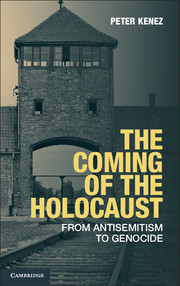Book contents
2 - Jews of the Russian Empire and of the Soviet Union
Published online by Cambridge University Press: 05 June 2014
Summary
The ancestors of the great majority of the victims of the Holocaust lived in the Russian Empire. In contrast to France with its few tens of thousands of acculturated Jews, 5.2 million Jews lived in the Russian Empire, according to the census of 1897 (making up approximately 4 percent of its population and representing more than half of world Jewry), living a life altogether different from their coreligionists in the West. When people thought of a “Jewish problem” in the nineteenth century they had in mind mostly the difficulties facing Jews of Russia.
The extent and nature of Russian antisemitism differed from that in the West. Russia was the home of pogroms, one of the few Russian words that came into the English language (from the Russian Gromit’, meaning break or smash). Unlike in the West, Russian antisemitism was not only a popular sentiment but also government condoned, inspired, and supported. Russians were preoccupied with the “Jewish question” in the first decades of the twentieth century, and this preoccupation during the Revolution and the ensuing civil war became a powerful destructive force. Russian refugees, escaping the Bolsheviks, then spread their pathological concern with Jews to the West, in particular to Germany. In this way Russians had a major influence on Nazi antisemitism.
- Type
- Chapter
- Information
- The Coming of the HolocaustFrom Antisemitism to Genocide, pp. 30 - 51Publisher: Cambridge University PressPrint publication year: 2013



